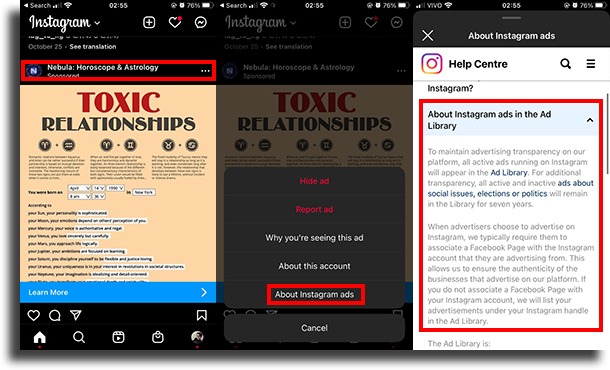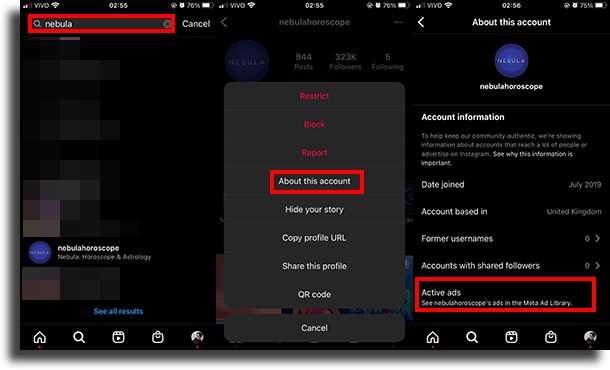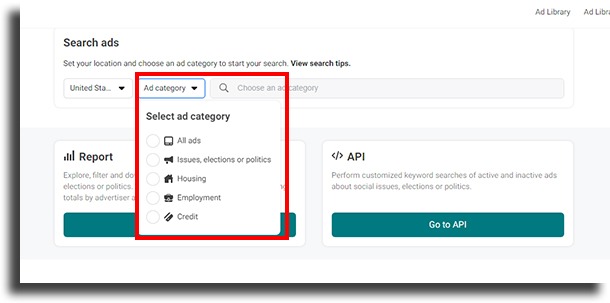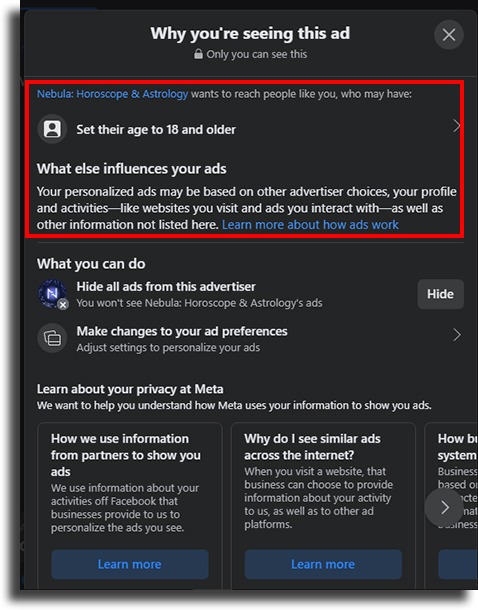Through the Meta Ad Library, you can find out a lot of information about how competitors are advertising, from targeting to the channels used, as well as the creatives used and other important information to consider.
In this article, we will describe some of this information to help you improve your searches and identify better strategies by researching campaigns from other profiles.
Searching ads
Through the Meta Ads Library, you can view the active ads of any company, from your competitors’ ad campaigns to big brands to be able to mirror yourself. That’s right, a lot of data is there, available for anyone to access, with a lot of very useful information for your campaigns. Below is a list of things you can learn by accessing and looking at the Meta Ad Library.
6 things you can learn by accessing the Ad Library
Many important details can be accessed just by clicking the “View Ad Details” button on any ad in the library. Let’s go to them.
1. How your competitors are promoting their services
Promotions and discounts from your competitors’ ad campaigns on Facebook and Instagram can be discovered by visiting the Meta Ad Library. There, you can access information about what is being broadcast and how these promotions are being applied, so you can structure your offers, and check if it’s worth offering a discount or a temporary promotion, for example. With this information in hand, it is easier to plan the structure of your marketing actions. Is it worth considering some other channel for advertising promotions and offers? Maybe, all of a sudden, your competitors are capturing customer contact information, like an email and phone list, for example. Will it be interesting to work in this segment?
2. Which platforms are used by competitors?
As we said above, in addition to understanding the way of capturing and disseminating offers, with the Ad Library you have access to the advertising placement platforms. Is the focus of competitors or brands in your segment on Facebook? On Instagram? Or maybe Messenger or even Audience Network? There are some possibilities to reach your potential customers and observing how advertisers in your segment break down their campaigns, and which channels they focus on, can be very interesting. So you can choose the best direction.
3. Calls to action that convert
Another point to learn from the competition is the famous CTA (call to action). Calls to Action are key features in ads. The clearer and more specific, the greater the likelihood of customer clicks. Maybe you always use the same ones, so taking that peek at what’s different in the market and learning from the possible CTAs scattered around can get you good clicks. Also, you can learn a lot from good titles and subtitles. Worth investing your time there!
4. Where are they directing traffic?
It isn’t easy to know what the target of the ads is, whether they are being directed to the company’s website, to WhatsApp, or to a survey. That’s because these landing pages don’t always show up in searches. However, in the Ad Library, you can click on the ad link and check the campaign target. Thus, you will be able to understand the construction of your competitors’ sales funnel and stipulate what your best sales strategies will be.
5. Types of creatives being used
Art design, videos, and carousels, through the Ads Library you will be able to search all formats of your competitors’ ad campaigns. You can use these ideas to build on and create different types of creatives and different formats or lengths of videos, Stories, Reels, and many other insights that improve the performance of your campaigns.
6. Are your competitors collaborating with partners?
On the rise recently, many brands have joined partners to promote their products. Have your competitors, and even brands with similar niches to yours, been using this resource? In what way? Who are possible partners? In the Ad Library, both organizations appear at the top of the ad. That way you can use this information to generate ideas from interesting partners or influencers to improve the results of your business campaigns.
How to access the Ad Library
There are three different ways for you to access the library and we will explain each of them below, emphasizing everything you can explore in each one.
1. Look for a competitor on Facebook
To find ads through a competitor on Facebook, first, open your Facebook app or access it from your computer. Go to the page of the brand you would like to know more about and scroll down until you see the “Page transparency” panel and click on “See all”. Scroll down and look for “Ads from this page”, and click “Go to Ad Library” to start browsing.
There you will have access to all active ads for this company, in chronological order. But you can also filter your search by language, platform, media type, impressions by date, and keyword.
2. Find a competitor with the Instagram app
The second way to find a competitor is through a brand ad, which is visible in your feed. There you can click on the three dots in the upper right corner of the ad and select “About Instagram Ads”. Then scroll down a bit and click on “About Instagram Ads in Ad Library” and again on “Ad Library” which is in blue.
If you want to search for a specific profile, search for the account by tapping the magnifying glass icon on the bottom bar of the app to access the Explore tab. Enter the profile name in the search bar and tap to visit the account. On the account profile, tap the three dots in the upper right corner. Select “About this account” from the menu that appears for you. If there are active ads, you will see the “Active Ads” option with a blue link to visit the Meta Ad Library, ie the Meta Ad Library.
3. Search for keywords in the Ad Library
The last option for searching competitors’ Facebook and Instagram ad campaigns is to go directly to the Meta Ad Library website at www.facebook.com/ads/library/. In the library search bar, enter the company name to start the search. You can also type a keyword in the search bar. So you can search for a specific topic or niche, for example. Now that you know the three ways to search the ad library, let’s talk about how to get detailed reports for competitors in special ad categories.
Special ad categories
Most of the time, the library will only show ads that are active, appearing up to 24 hours after the first impression. Once completed, or paused, they disappear from the ad library. However, there is an exception to this rule, which are special announcements that are related to categories such as Social Issues, Elections, or Goal Policies. These ads remain active for up to 7 years so they can be searched and found even after campaigns end. To view them, use the search bar, as shown below, and select from the drop-down menu in the left corner: “Themes, elections, or politics”.
You will see that paused or completed ads show the status as inactive. Others might include a note that the ad ran without a special category notice, meaning the tool removed the ad.
Accessing Meta Ads Library reports
There is also the possibility of generating reports to compare the advertisers of this special category, which can be very interesting, especially in an election year. You can generate the reports by clicking on the “Ad Library Report” button on the top right menu or by accessing this link: www.facebook.com/ads/library/report/. Under “Spend Control”, you can search for ad data on social issues, elections or politics, access overall spend totals, spend by specific advertisers and spend data by geographic location.
What you can learn from Meta Ad Library reports
This category, unlike ordinary Facebook and Instagram ads, requires data to be available for public consultation. The data provided is much more detailed, too. The “View Summary Details” button can provide you with data such as:
The total amount spent on the ad How many impressions did the ad generate? Who viewed the ads, including age and sex breakdowns Where people saw ads, including states, regions, or countries
If you want, you can have an idea of invested budgets according to each audience profile, demographic profile, and even ad type to compare with your goals and strategies.
Learning more about ad targeting
Another way to learn a little more about ad targeting, without accessing the special ads, is through your Facebook and Instagram feeds. This option can be very useful at the time and offer ideas on how to better reach your target audience. There is only one issue to be highlighted here, as this approach depends on the work of the algorithm, there are no formulas for a survey. It is a search for knowledge and understanding of the persona of your business. You can learn a few things by clicking on the ads that appear in your feed, on the three dots, and then on the option “Why am I seeing this ad”. There will be some parameters of the segmentation used.
And what can you learn from it? In the vast majority of cases, the parameters are quite comprehensive, such as your age and location. And this may not be exactly what you need, but at times, the segments may appear more detailed, such as some types of audience interests.
So, with these segmentations, maybe your ideas of the type of audience for your campaigns can expand. There are ways to segment with, for example, similarities with the brand’s customers, or with common interests, and even through lists loaded with data from your customers or prospects who have already been interested in your products, or who have downloaded your e-book. In conclusion, there are countless ways to learn to research and learn from your competitors’ Facebook and Instagram ad campaigns. The main point is to be sure who your customer is, what your business persona is, and then create campaigns with all this data integrated above. Another super important thing to consider is that some businesses may not be advertising on Facebook and Instagram, but that doesn’t mean they aren’t advertising anywhere. There are several free tools that can help you analyze other channels to invest in ads. You can compare your site with competing sites, for example, and thus improve the way you invest in your campaigns and bring more customers to your business. It’s worth researching which channels work best for your niche. Understanding how your competitors advertise is a great way to learn, adjust and test new strategies and budgets on each platform.
Do you understand how to search for competitor ad campaigns on Facebook and Instagram?
So share this article with someone who might be interested and enjoy some related content that can help you increase your sales:
How to create a sales website? [Full Guide for 2022] How to make a quiz on Instagram Stories! How to be famous on TikTok [Complete Guide 2022]






